| Srl | Item |
| 1 |
ID:
124601
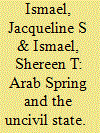

|
|
|
|
|
| Publication |
2013.
|
| Summary/Abstract |
This article examines the ongoing Arab Spring uprisings. The Arab Spring is characterized as a fundamental challenge to the postcolonial political order of the Arab world. The postcolonial Arab world has been defined by its oppressive nature and its subjugation within the international system. This autocratic and peripheral order represents the political legacy of colonial rule, where the postcolonial regimes inherited and refined the repressive techniques of the colonial regimes while, owing to international developments, reinforcing their subjugated status within the international system. The Arab Spring has, thus, represented an attempt to chart an independent path in Arab politics, marked by efforts towards democracy and civil rights. The successes and failures of the Arab Spring are critically evaluated, paying special attention to the role played by Islamist political actors. Beyond an evaluation of the domestic factors behind the various protests, the regional significance of the uprisings is evaluated, providing discussion of counterrevolutionary forces and political-sectarian developments.
|
|
|
|
|
|
|
|
|
|
|
|
|
|
|
|
| 2 |
ID:
124608
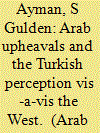

|
|
|
|
|
| Publication |
2013.
|
| Summary/Abstract |
The article argues that Turkey's perception of the West has been heavily influenced by its idealized identity. After evaluating the circumstances under which this idealized identity began to weaken, it shows how the images of the US and Europe have started to get compartmentalized and Israel separated from the image of the West. The article explains the relationship between the continuing process redefining Turkey's "personal identity" and its growing interest in the Middle East. The transformation process that Turkey is passing through is critically important in understanding the way in which Turkey has been affected by the upheavals and is reacting to the new developments in the region. In this vein the article highlights the interaction between power considerations and aspirations to re-define identity at home and abroad.
|
|
|
|
|
|
|
|
|
|
|
|
|
|
|
|
| 3 |
ID:
124602
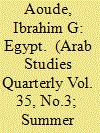

|
|
|
|
|
| Publication |
2013.
|
| Summary/Abstract |
The upheaval that has swept the Arab world, beginning in December 2010, reached Egypt on January 25, 2011. The article argues that capitalist globalization and ultimately the 2008 global financial crisis were main causes of the uprising. The Mubarak regime's privatization schemes exacerbated poverty and widened the already huge gap between rich and poor. Mubarak employed repression to ensure that no effective political opposition would materialize to challenge his authoritarian rule and crony capitalism. Strikes and demonstrations beginning in 2006 and the lead up to the uprising demonstrated that the fight for democracy and economic justice had been intertwined. The ouster of Mubarak has not improved the economic situation for the majority of the population and authoritarian rule remained under the military and since the election of the Islamist President Morsi. Popular resistance continues against the Islamists in power to bring about a secular regime that would establish democracy and economic justice.
|
|
|
|
|
|
|
|
|
|
|
|
|
|
|
|
| 4 |
ID:
124606
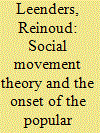

|
|
|
|
|
| Publication |
2013.
|
| Summary/Abstract |
This article takes stock of my attempt to scrutinize the onset of the Syrian uprising with the help of some key analytical concepts derived from social movement theory, including "opportunity" and "threat," "social networks," "repertoires of contention," "framing," and "diffusion." These tools allow me to identify and disentangle the mechanisms of early mobilization and the uprising and explain why they commenced in relatively peripheral areas. Social networks and framing processes are argued to have been key in mobilization, by transmitting opportunities derived from the "Arab Spring," by mediating the nexus between repression and mobilization, by creating and feeding a rich new repertoire of defiant protest acts and claims-making, and by aiding the diffusion or agglomeration of mobilization throughout the country.
|
|
|
|
|
|
|
|
|
|
|
|
|
|
|
|
| 5 |
ID:
124604


|
|
|
|
|
| Publication |
2013.
|
| Summary/Abstract |
This article purports to examine the role of the United States in the outbreak of the Arab Spring and the course of its subsequent paths. The main argument of this article is that the Arab Spring represented a major strategic surprise to the United States. It did not plan or facilitate the Arab Spring as the Tunisian, Egyptian, Yemeni and Bahraini regimes were performing to the best satisfaction of American interests in the Arab world. As the Arab Spring carried with it threats to American regional interests, the United States moved to secure its interests by steering Arab uprisings towards courses of action which best suit these interests.
|
|
|
|
|
|
|
|
|
|
|
|
|
|
|
|
| 6 |
ID:
124607
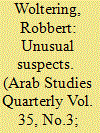

|
|
|
|
|
| Publication |
2013.
|
| Summary/Abstract |
The Egyptian revolution that started on January 25 engaged many people who theretofore had not been considered political actors. Among them were the Ultras, a particular group of football fans who are widely credited to have played a part in the more physical aspects of the uprising. In this article the Ultras are studied by means of an analysis of their own written material, their internet presence, and fieldwork conducted in Cairo. It is argued that the Ultras have quite naturally developed into a revolutionary social movement.
|
|
|
|
|
|
|
|
|
|
|
|
|
|
|
|